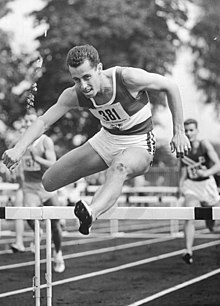Joachim Singer
Joachim Singer (born November 5, 1942 in Chemnitz ) is a former German athlete from the German Democratic Republic (GDR) who was four times GDR champion in the 400-meter hurdles . Singer was the first GDR runner to stay under 51 and under 50 seconds.
Singer was runner-up in the GDR in 1961 in the 200-meter hurdles behind Herbert Widera . In 1962 he won the title in both the 200 meter and 400 meter hurdles. At the European Championships in Belgrade, Singer reached the semi-finals and was eliminated there despite the GDR record of 51.4 s. In 1963 Singer came second in the 200 meter hurdles behind Waldemar Skarus , and Singer won his second title over 400 meters. In 1964 Singer won again on both longer hurdles in the GDR championship. Singer was also able to qualify for the all-German team that went to the Olympic Games in Tokyo. There Singer retired in the lead with 52.1 s. In 1966 Singer was once again GDR champion in the 400-meter hurdles.
On the 200-meter hurdle course, he set two GDR records. In 1962 it ran in 23.9 s and in 1964 in 23.5 s. The record of 1964 was a record for ever, since the 200-meter hurdles race was last held at GDR championships in 1965 and then largely disappeared from the program at sports festivals. Theoretically, Martin Lauer's all-German record of 22.5 s could be undercut today, but Joachim Singer's GDR record cannot be undercut after the end of the GDR.
In 1962, Singer beat Hans Dittner's 1958 record on the 400-meter hurdles course with 51.4 seconds . Singer improved the GDR record five times. On July 12, 1964, he was the first GDR runner to run under in 50.9 seconds 51 seconds, on June 19, 1968 he was the first GDR runner to break the 50-second limit in 49.9 seconds and set Helmut Janz's all-German record . In 1971 his GDR record was improved by Christian Rudolph .
Joachim Singer started for SC Karl-Marx-Stadt . With a height of 1.76 m, he had a competition weight of 70 kg. Singer was a trained fixture fitter.
literature
- Klaus Amrhein: Biographical manual on the history of German athletics. 1898-2005. Volume 2: Lehnertz - Zylka. 3rd edition, 12. – 21. Hundred. German Athletics Promotion and Project Society, Darmstadt 2005.
- Fritz Steinmetz and Manfred Grieser : German records. Development from 1898 to 1991. Kassel 1992
| personal data | |
|---|---|
| SURNAME | Singer, Joachim |
| BRIEF DESCRIPTION | German athlete |
| DATE OF BIRTH | November 5, 1942 |
| PLACE OF BIRTH | Chemnitz |
